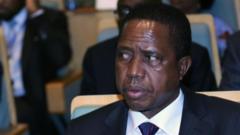The embattled leader faces intensified calls for his resignation but insists on staying the course through the ongoing legislature.
**Sánchez Stands Firm Amidst Political Turmoil and Corruption Accusations**

**Sánchez Stands Firm Amidst Political Turmoil and Corruption Accusations**
Spanish Prime Minister remains resilient despite mounting scandals involving his Socialist party.
Pedro Sánchez, who initially ascended to power by vowing to cleanse Spain's political landscape, is now entangled in various corruption investigations involving his Socialist party (PSOE). The tensions heightened recently when leaked audio suggested an internal discussion regarding illicit commissions linked to public contracts by PSOE secretary Santos Cerdán. While Sánchez has not faced direct allegations, the fallout has galvanized an opposition eager to see him resign.
Following the exposure, Cerdán quickly stepped down from his party duties and is scheduled to present his case before Spain's Supreme Court later this month. He maintains his innocence in the allegations and asserts that he has never acted unlawfully. The fallout extends beyond Cerdán, as it also implicates former PSOE secretary José Luis Ábalos and advisor Koldo García, both of whom have similarly denied any wrongdoing.
Sánchez, acknowledging a lapse in judgment regarding his confidence in Cerdán, has still pledged to fulfill the current legislative term until 2027. In a letter to party supporters, he apologized and emphasized the pressing societal issues that need addressing, including healthcare and climate change, which he believes warrant continued political commitment.
Opposition parties have framed the investigation as emblematic of a corrupt regime, underlining a range of inquiries touching on Sánchez's close circle, including investigations into his wife, Begoña Gómez, and his musician brother, David. Amidst calls for his resignation, opposition leaders have capitalized on public discontent, accusing Sánchez of leading a "corrupt pack."
Polling analysts note that a Sánchez resignation could ignite a political crisis that might favor the opposition People's Party (PP) and the far-right Vox, potentially reshaping Spain's political spectrum. The current snapshot of Spanish public sentiment suggests a strong mobilization of right-wing voters against a disheartened left, further complicating Sánchez's standing.
Despite the pressures mounting both internally and externally, Sánchez is striving to maintain alliances with his left-wing and nationalist supporters to secure his fragile parliamentary majority. He is attempting to introduce new budgetary plans to placate constituents and stave off opposition attacks.
As he prepares for the upcoming NATO summit, Sánchez must navigate the dual pressures of political instability at home and international expectations regarding Spain's defense commitments. Notably, despite prior promises to elevate military spending, he has resisted potential hikes suggested by NATO allies, arguing that they may prove impractical for Spain's economic conditions.
The unfolding situation remains critical, as Sánchez's political future hinges on managing both the fallout from the scandals and the broader public response leading to future elections.
Following the exposure, Cerdán quickly stepped down from his party duties and is scheduled to present his case before Spain's Supreme Court later this month. He maintains his innocence in the allegations and asserts that he has never acted unlawfully. The fallout extends beyond Cerdán, as it also implicates former PSOE secretary José Luis Ábalos and advisor Koldo García, both of whom have similarly denied any wrongdoing.
Sánchez, acknowledging a lapse in judgment regarding his confidence in Cerdán, has still pledged to fulfill the current legislative term until 2027. In a letter to party supporters, he apologized and emphasized the pressing societal issues that need addressing, including healthcare and climate change, which he believes warrant continued political commitment.
Opposition parties have framed the investigation as emblematic of a corrupt regime, underlining a range of inquiries touching on Sánchez's close circle, including investigations into his wife, Begoña Gómez, and his musician brother, David. Amidst calls for his resignation, opposition leaders have capitalized on public discontent, accusing Sánchez of leading a "corrupt pack."
Polling analysts note that a Sánchez resignation could ignite a political crisis that might favor the opposition People's Party (PP) and the far-right Vox, potentially reshaping Spain's political spectrum. The current snapshot of Spanish public sentiment suggests a strong mobilization of right-wing voters against a disheartened left, further complicating Sánchez's standing.
Despite the pressures mounting both internally and externally, Sánchez is striving to maintain alliances with his left-wing and nationalist supporters to secure his fragile parliamentary majority. He is attempting to introduce new budgetary plans to placate constituents and stave off opposition attacks.
As he prepares for the upcoming NATO summit, Sánchez must navigate the dual pressures of political instability at home and international expectations regarding Spain's defense commitments. Notably, despite prior promises to elevate military spending, he has resisted potential hikes suggested by NATO allies, arguing that they may prove impractical for Spain's economic conditions.
The unfolding situation remains critical, as Sánchez's political future hinges on managing both the fallout from the scandals and the broader public response leading to future elections.




















